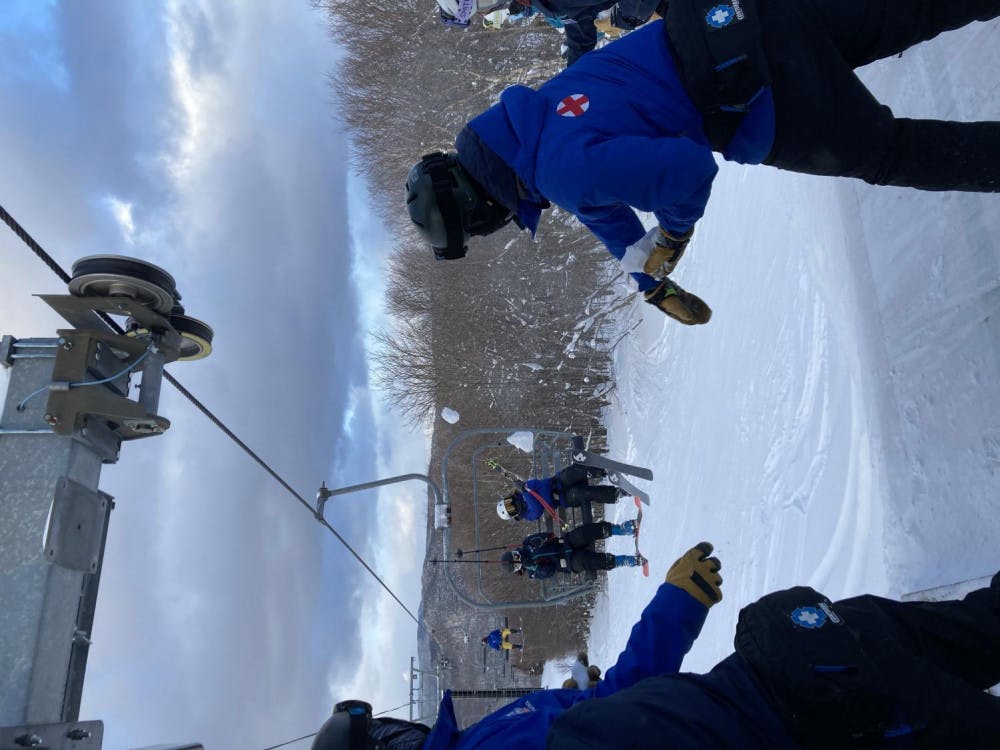Members of the Middlebury Ski Patrol, a powder-loving team of first responders that monitors the Snow Bowl each ski season, were among the college’s first students to receive a Covid-19 vaccination in Vermont. As a state-licensed First Response Unit, the ski patrollers received the first round of shots in early winter under the state’s 1a phase of vaccine distribution.
Ski Patrol is responsible for hazard marking and mitigation, search and rescue operations, emergency medical services (EMS) and the consistent monitoring of all trails during open hours at both the Snow Bowl and Rikert Nordic Center. While many patrollers are in an age group statistically less vulnerable to Covid-19 compared to other members of the community, the high risk of exposure posed by their job was a motivating factor to accept a vaccination — especially due to the higher chance of unknowingly spreading the disease.
“The thought definitely occurred to me that I wished I could give my dose of the vaccine to someone that is more vulnerable to having severe symptoms,” patrol staffer Michael Freeman ’22 explained. “However, there are lots of factors out of our control when it comes to injuries, and the often-unavoidable close contact with patients while treating them puts me at a high risk of contracting and spreading Covid-19.”
Ski Patrol student president Mason Olmstead ’21 cited the team’s commitment to keeping the mountains well-staffed and operational as another reason to get the vaccine. “It was important for us as a patrol to be vaccinated so that the Snow Bowl had the best chance of continued operation throughout the winter,” he said.
Allaying anxieties about potentially contracting Covid-19 has also helped some patrollers better focus on attending to patients. “For me personally, [being vaccinated] does give me peace of mind when I’m treating somebody and lets me focus on my work,” Patrol Director Sean Grzyb said.
However, the additional comfort provided by vaccination has not made any patrollers complacent about following all other safety rules.
The patrollers working this winter have been required to use goggles on the slopes, wear PPE gloves and masks at all times and be fitted for N95 masks to use when treating patients for more serious injuries that require a longer period of exposure. Patrollers have also begun carrying both adult and pediatric masks to provide to patients.
Grzyb stressed continued vigilance in adhering to all new guidelines, and Olmstead acknowledged that because the vaccine is not 100% effective, he still needs to adhere to other precautions. “Having the vaccine has not changed the way I live my life. I still wear a mask, wash my hands more than I probably should and use Purell religiously,” he said.
The Ski Patrol staff consists entirely of Middlebury student volunteers, with the exception of Grzyb. However, with J-Term being conducted remotely, the team of around 35 students, who typically each work one and a half to two days a week, has been reduced to a skeleton crew of eight to 10 patrollers, all working 20 hours a week as paid employees. “We are spread pretty thin, but everyone has stepped up and really focused, and it’s been working well,” Grzyb said.
Grzyb also noted that staffing has been tricky because the number of patrollers who can be in the patrol huts at once is limited, but there must be enough people on duty to cover the mountains and perform a lift evacuation if necessary.
“We have become much more reserved about the number of patients brought into the patrol hut, for obvious exposure reasons,” Olmstead said.
Consequently, much more of the assessment and treatment process now takes place on the slopes or in newly installed outdoor medical response tents with adequate airflow, instead of the normal routine of a rapid assessment outside followed by a more thorough examination in the patrol hut. “That is a big shift,” Grzyb said. “Outside in the elements, it is cold.” Moreover, medical supplies are kept in patrol huts, necessitating a second patroller to bring what is needed while the first remains with the patient.
During instances where bringing a patient inside is necessary, such as in the case of major trauma or another serious emergency, all huts have been equipped with air filters that are kept on at all times. Check-in windows have also been installed at patrol huts so visitors in need of assistance can communicate with patrollers without entering the space.
Another change has been the decrease in the social aspects of the job. “Honestly, the toughest part has been not being able to send a quick smile to a fellow patroller, lift operator or member of the public. As in our everyday lives, we as patrollers have to be more conservative with our interactions with other humans,” Olmstead said.
The plethora of changes to Ski Patrol’s normal operating procedures required a period of transition, but they’ve been worthwhile and effective in keeping staff and visitors alike safe. After a few weeks, patrollers were well-adjusted to the new normal and are optimistic about a smooth rest of the season. “By mid-January, we hit our stride,” Grzyb said. “Everyone is dialed in right now.”
Correction: An earlier version of this article misspelled Sean Grzyb’s name.

Ideal Dowling '22 is an Editor at Large.
She previously served as a copy editor and Local section editor.
Dowling is majoring in Political Science and minoring in French and History. During the summer of 2021, she worked as a consultant for the startup accelerator Aegis Ventures and as a research assistant for Professor Stanley Sloan as he worked on his book "De-Trumping U.S. Foreign Policy: Can Biden Bring America Back?" In addition to her work at The Campus, Dowling is captain of Middlebury's women's squash team and an employee at the Middlebury College Museum of Art.




